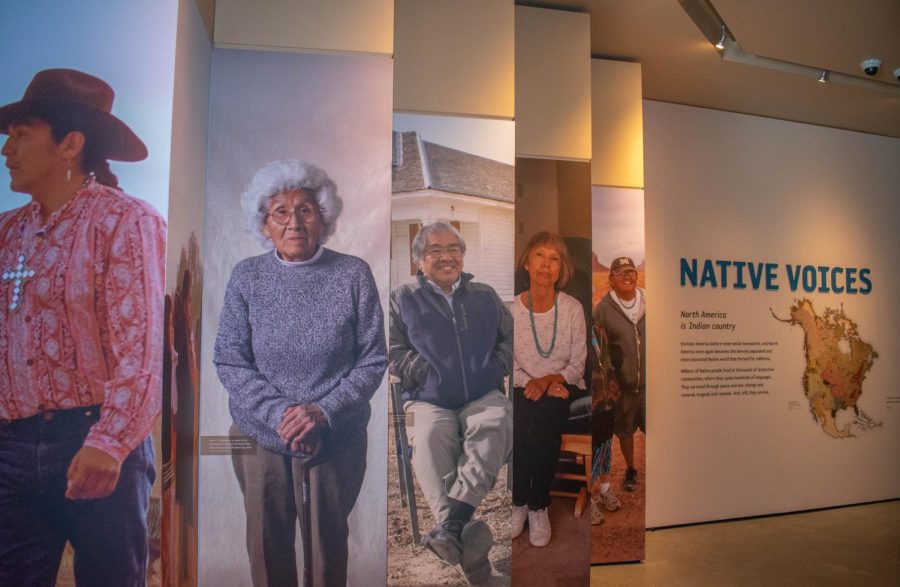Lien: Keep Native Families Together
An exhibit about Utah Indigenous history at the Natural History Museum in Salt Lake City on Feb. 6, 2023. (Photo by Andrea Oltra | The Daily Utah Chronicle)
February 15, 2023
H.B. 40, the Indian Child Welfare Amendments, offers protections for Native American children during adoption and foster care processes and allows for tribes to express their sovereignty. Yet, the bill has been held up in committee because it was deemed “unnecessary.”
The Indian Child Welfare Amendments bill helps to codify important federal safeguards for Utah natives and repair damage the state has caused.
Utah’s very existence is owed to the Natives who were here long before the Pioneers stepped foot on this land. Mormon settlers originally stood against the slave trade of Natives, but started buying slaves regularly to convert them to Mormonism. Brigham Young encouraged members to “buy up the Lamanite children,” which is a whole issue in and of itself, considering that the Lamanites, according to the LDS church, were a band of people cursed with a “skin of blackness” for their wickedness.
Mormon settlers ended up perpetuating the slave trade as child slaves became a vital source of labor. Slavery was abolished in 1862, but the Church continued in their endeavors to convert Native Americans. The Indian Placement Program (IPP) or the Indian Student Placement Program, also known as the Lamanite Placement Program, ran from 1954 to 1996.
Native American students who were baptized in the Church were placed in foster homes of LDS members during the school year. The IPP’s objective was the “assimilation and ‘whitening’ of Indian children as a divine imperative outlined in the Book of Mormon.” While originally intended as an “educational opportunity,” the IPP ended up as foster care. In 2015, the Doe Defendants filed a lawsuit, claiming to have been sexually abused for years while in the foster program. The Church and state failed to protect them.
The federal Indian Child Welfare Act (ICWA) was created in 1978 to stop the systemic removal of Native children from their tribes and families. Children often were taken without any valid reason.
Some argue against the ICWA, stating that it violates the 14th Amendment by discriminating against non-Native families. Children are placed, in level of priority, with their families and non-Native kin, members of their tribe, other Native families and finally with non-Natives. Issues also arise with children who have Native ancestry but are not enrolled members of a tribe, as these adoptions or foster proceedings would not fall under the Act. Tribes do, however, work with non-Natives interested in fostering and adopting Native children, but they ask that families maintain an open adoption.
The ICWA intends on keeping Native children with their families and tribe, and allows for children to have a connection to their roots. It is imperative in fostering a strong sense of pride for one’s heritage.
H.B. 40 comes amid the Supreme Court challenging the national Indian Child Welfare Act. The bill intends to codify the Act, in case the Court strikes it down. Currently, H.B. 40 is being held and supposedly added to a future agenda. The prospect of it getting lost among all the other bills is high and frightening.
Before ICWA, approximately 80% of Native families on reservations lost at least one child to the foster care system, amounting to about a third of all Native children being removed from their homes. An astounding 85% of those children were placed outside their families and communities, even when willing relatives were available.
Eight sovereign tribes currently call Utah home: Confederated Tribes of Goshute, Navajo Nation, Northwestern Band of Shoshone Nation, Paiute Indian Tribe of Utah, San Juan Southern Paiute, Skull Valley Band of Goshute, Ute Mountain Ute Tribe and the Ute Indian Tribe of the Uintah & Ouray Reservation. All have expressed support for H.B. 40. The bill has received a number of supportive public comments in a committee hearing and none opposing it.
With unanimous support from all eight tribes, standing in the way of this bill is both absurd and disheartening. With Utah’s history of abuse, striking down a bill with such extreme approval sends a clear message to Natives.
On Jan. 31, tribal leaders from across the state gathered at the Capitol to bring the issue to the legislators themselves. In an article published by KSL, the chairwoman of Paiute Indian Tribe of Utah, Corrina Bow, stated, “To table HB40 on a minor technicality — knowing that this bill is so important to all of our eight sovereign nations of Utah — is an injustice.” Passing H.B. 40 wouldn’t change anything, as the federal ICWA is still in place. It would simply ensure that, if the Supreme Court strikes it down, the Native people of Utah can keep their children.
Utah has a duty to Native Americans, who have been hurt throughout the state’s history. Passing H.B. 40 is not only an obligation, but a necessary safeguard. Even if the federal ICWA is maintained, this state needs to show compassion and recognition of the Native peoples.









